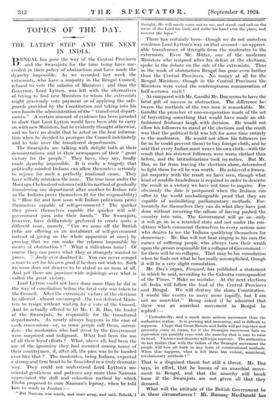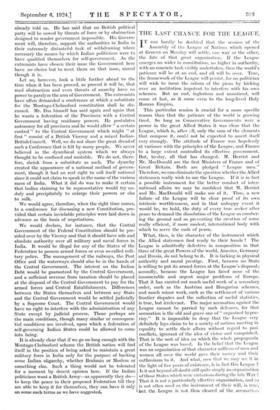TOPICS OF THE DAY.
THE LATEST STEP AND THE NEXT IN INDIA.
BENGAL has gone the way of the Central Provinces and the Swarajists for the time being have suc- ceeded in their policy of obstruction and have made the dyarchy impossible. As we recorded last week the extremists, who have a majority in the Bengal Council, refused to vote the salaries of Ministers ; and thus the Governor, Lord Lytton, was left with the alternatives of trying to find new Ministers to whom the extremists might graciously vote payment or of applying the safe- guards provided by the Constitution and taking into his own hands the administration of the " transferred depart- ments." A certain amount of evidence has been paraded to show that Lord Lytton would have been able to carry on with new Ministers, but he evidently thought otherwise, and we have no doubt that he acted on the best informa- tion when he decided to prorogue the Council indefinitely and to take over the transferred departments.
The Swarajists are talking with delight both at their demonstrations and in their newspapers of their " great victory for the people." They have, they say, finally made dyarchy impossible. It is really a tragedy that politically-minded Indians can allow themselves seriously to rejoice for such a perfectly irrational cause. They have wilfully mistaken the issue. The true issue under the Montagu-Chelmsford reforms (with its method of gradually transferring one department after another to Indian rule as the Indians prove themselves fit for the responsibility) is " How far and how soon will Indian politicians prove themselves capable of self-government ? The quicker they prove themselves capable the quicker will self- government pass into their hands." The Swarajists, however, have deliberately preferred to create quite a different issue, namely, " Can we score off the British (who are offering us an instalment of self-government instead of giving us the whole apparatus at once) by proving that we can make the reforms impossible by means of obstruction ? " What a ridiculous issue ! Of course they can prove what they so strangely wanted to prove. i Jbody ever doubted it. You can never compel a man to act for his own good if he does not wish to. Such an issue does not deserve to be stated as an issue at all. And yet there are province-wide rejoicings over what is called the great victory.
Lord Lytton could not have done more than he did in the way of conciliation before the fatal vote was taken in the Council. After the extremists' victory at the elections he allowed—almost encouraged—the two defeated Minis- ters to resign without waiting for a vote of the Council. And he actually offered to let Mr. C. R. Das, the leader of the Swarajists, be responsible for the transferred departments. As nearly always happens in the case of such concessions—or, as some people call them, surren- ders—the moderates who had stood by the Government were surprised and indignant. What had been the use of all their loyal efforts ? What, above all, had been the use of the ignominy they had incurred among many of their countrymen, if, after all, the pass was to be handed over like that ? The moderates, being Indians, expected a strong and firm hand to be flourished in a truly dramatic way. They could not understand Lord Lytton's un- oriental gentleness and patience any more than Naaman appreciated the dull and colourless method by which Elisha proposed to cure Naaman's leprosy, when he told him to wash in Jordan :— " But Naaman was wroth, and went away, and said, Behold, I
thought, Ho will surely come out to me, and stand, and call on the name of the Lord his God, and strike his hand over the place, and recover the leper."
There has certainly been—though we do not ourselves condemn Lord Lytton's way on that account—an appreci- able transference of' strength from the moderates to the extremists. Even Mr. Mitter, one of the moderate Ministers who resigned after his defeat at the elections, spoke in the debate on the side of the extremists. Thus in the work of obstruction Bengal has gone even farther than the Central Provinces. No money at all for the Bengal Ministers, though in the Central Provinces the Ministers were voted the contemptuous remuneration of half-a-crown each !
As compared with Mr. Gandhi Mr. Das seems to have the fatal gift of success in obstruction. The difference be-- tween the methods of the two men is remarkable. Mr. Gandhi the preacher of non-co-operation made of the art of boycotting something that would have made an old- fashioned Irishman laugh with derision. He would not allow his followers to stand at the elections and the result was that the political field was left for some time entirely to the moderates. He would not allow his followers (so far as he could prevent them) to buy foreign cloth, and he said that every Indian must weave his own cloth—with the result that his strictest followers were worse clothed than before, and the latitudinarians took no notice. But Mr. Das, so far from leaving the elections alone, determined to fight them for all he was worth. He achieved a Swara- jist majority with the result we have seen, though what kind of muddle-headedness is required in order to describe the result as a victory we have not time to inquire. For obviously the date is postponed when the Indians can offer to the world unchallengeable proof that they are capable of assimilating parliamentary methods. For- tunately for themselves they can do what they have just done without incurring the odium of having pushed the country into ruin. The Government will go on—only it will go on in a retarded state and not under the con- ditions which commend themselves to every serious man who desires to see the Indians qualifying themselves for democracy. Mr. Das will not hear ringing in his ears the curses of suffering people who always turn their wrath upon the person responsible for a collapse of Government— for there will be no collapse. That may be his consolation when he finds out what he has really accomplished, though it will be a very slight consolation.
Mr. Das's organ, Forward, has published a statement in which he said, according to the Calcutta correspondent of the Times, " Make no mistake. At the next elections all India will follow the lead of the Central Provinces and Bengal. We will destroy the sham Constitution. I would like events to move more rapidly, but I am not an anarchist." Being asked if he admitted that there was an anarchist movement in Bengal he replied :- " Undoubtedly, and a much more serious movement than the authorities realize. It is growing and increasing, and is difficult to suppress. I hope that Great Britain and India will get together and presently come to terms, for if the Swarajist movement fails no repression can possibly cope with the anarchy that is sure to raise its head. Violence and disorder will reign supreme. The authorities do not realize that with the failure of the Swarajist movement the people will lose all faith in any form of constitutional methods. When that happens, what is left them but violent, anarchical,
revolutionary methods ? "
That is a disguised threat but still a threat. Mr. Das says, in effect, that he knows of an anarchist move- ment in Bengal, and that the anarchy will break loose if the Swarajists are not given all that they demand.
What will the attitude of the British Government be in these circumstances ? Mr. Ramsay MacDonald has already told us. He has said that no British political party will be cowed by threats of force or by obstruction designed to render government impossible. His Govern- ment will, therefore, support the authorities in India in their extremely distasteful task of withdrawing where necessary the means by which Indian politicians were to have qualified themselves for self-government. As the extremists have chosen their issue the Government here have no choice but to meet them on that issue, unreal though it is.
Let us, however, look a little further ahead to the time when it has been proved, as proved it will be, that mad obstruction and even threats of anarchy have no power to paralyze the arm of Government. The extremists have often demanded a conference at which a substitute for the Montagu-Chelmsford constitution shall be dis- cussed. Mr. Das himself has said again and again that he wants a federation of the Provinces with a Central Government having residuary powers. He postulates autonomy for all provinces and he would allow " a certain control " to the Central Government which might " at first " consist of a British Viceroy and a mixed Indian- British Council. Well, we do not share the great dread of such a Conference that is felt by many people. We never believed in the dyarchical system which we always thought to be confused and unstable. We do not, there- fore, shrink from a substitute as such. The dyarchy created the appearance of a national method of govern- ment, though it had no real right to call itself national since it could not claim to speak in the name of the various races of India. What it did do was to make it certain that bodies claiming to be representative would try un- duly and precipitately to enlarge their powers or else to sulk.
We would agree, therefore, when the right time comes, to a conference for discussing a new Constitution, pro- vided that certain inviolable principles were laid down in advance as the basis of negotiations.
We would declare, for instance, that the Central Government of the Federal Constitution should be pre- sided over by the Viceroy and that it should have sole and absolute authority over all military and naval forces in India. It would be illegal for any of the States of the Federation to possess armed forces or even so-called mili- tary police. The management of the railways, the Post Office and the waterways should also be in the hands of the Central Government. The interest on the Indian Debt would be guaranteed by the Central Government, and a sufficient revenue from taxation should be placed at the disposal of the Central Government to pay for the armed forces and Central Establishments. Differences between the States themselves and between any State and the Central Government would be settled judicially by a Supreme Court. The Central Government would have no right to interfere with the administration of any State except by judicial process. Those perhaps are the main conditions, though many similar or consequen- tial conditions are involved, upon which a federation of self-governing Indian States could be allowed to come into being.
It is already clear that if we go on long enough with the Montagu-Chelmsford scheme the British nation will find itself in the position of being asked to maintain a great military force in India only for the purpose of backing some Indian oligarchy, whether Brahmin or Moslem or something else. Such a thing would not be tolerated for a moment by decent opinion here. If the Indian politicians want a British Army—as apparently they do— to keep the peace in their proposed Federation till they are able to keep it for themselves, they can have it only on some such terms as we have suggested.







































 Previous page
Previous page